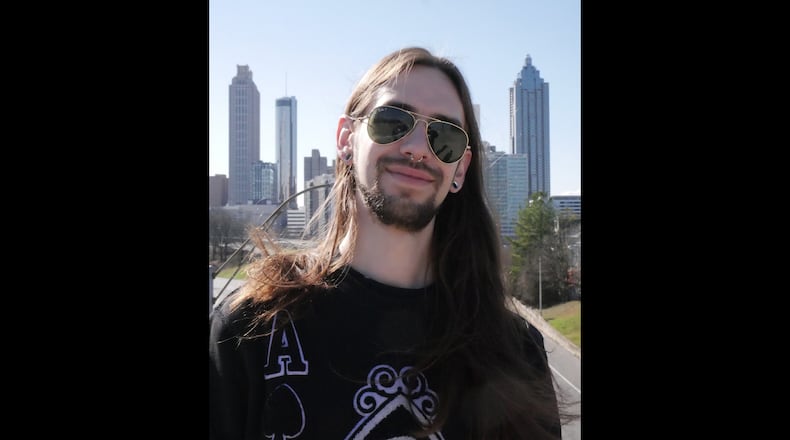Jay Crash, founder of the Atlanta-based record label Terminus Hate City, presides over a portion of the dark, ominous underground of the city’s rock music scene like Virgil in the fires of Dante’s Inferno. Music produced on the Terminus imprint comes from the outer extremes of heavy metal, punk and hardcore. It envelops the listener in raging monsoons of distorted instruments and deranged, vocal cord shredding howls that channel the souls of the damned.
It is a harrowing experience even for the most adventurous of music listeners. But beneath the willful insanity of the music itself is the vision of a man keenly committed to supporting and furthering a thriving DIY music scene amidst the perils of gentrification and urban renewal.
Terminus Hate City began humbly enough in 2018 during a late-night bull session among friends. “It was one of those long nights partying,” he says. “We were sitting around my round table one night and said, ‘Wow, what if we started up a record label?’”
Credit: Courtesy of Jay Crash
Credit: Courtesy of Jay Crash
Despite those whimsical origins, Terminus Hate City began to quickly develop forward momentum with the signing of its first artist, Ryan Buck, who would go on to become a business partner in the label. Now, four years later, the label sports an admirable roster of artists such as Atlanta death metal mainstays Awaken the Ancient, black metallers Krypt and the stoner/sludge ensemble Parasite Caste.
Crash derived the label’s name first from Terminus, the original name of Atlanta, and then added “Hate City” as a nod to the city’s long-standing reputation for being “the city that’s too busy to hate,” a slogan that developed in conjunction to Atlanta’s reputation for making economic prosperity the basis for its forward-thinking attitudes on race relations. “The Hate City [part of the name] was a metal/punk rock term of endearment,” he says.
Still, the Atlanta native is quick to note that the name is meant to carry a certain degree of sharp commentary about the reality of social unrest in the city. “This is still ‘hate city’,” he laments. “It’s a very activist, forward thinking, progressive city but there’s still a lot of things we can work on.”
Crash notes that the grassroots social activism aspect of the name is something that especially resonated with the city’s often politically minded punk rock scene.
Outstanding among those societal ills is one that has directly impacted Atlanta’s live music scene: the gentrification and urban renewal that has squelched many of the resources local musicians had relied upon, from professional rehearsal spaces to performance venues.
For Crash, like so many of his fellow rockers, the 2016 relocation of the Masquerade to Underground Atlanta was a bellwether of things to come: closing the original location meant the end of a community gathering spot where hoards of rockers could convene to enjoy the local businesses — including bars, restaurants and tattoo parlors — that stayed open late to accommodate the masses of concert attendees leaving the venue after shows.
As the city remodeled itself to welcome an influx of young urban professionals into the “hip” locales of Midtown, Little Five Points and the East Atlanta Village, the renovations came at the cost of shutting down much of the local businesses, bars, and performance halls that made the areas so appealing in the first place.
The result has been a rise in so-called “house venues,” private residences that have been renovated to function as concert venues such as the Catacombs in East Atlanta. It’s a newly emergent scene that Terminus Hate City, with its DIY ethos, is well suited to navigate.
Despite that invigorating shift towards community-centered support, Crash is well aware that stifling and annexing the underground music community is detrimental to the music business as a whole. After all, the next big thing has to come from humble origins somewhere. “Atlanta is sitting in a unique place,” he sys. “We are a cultural influencer and a cultural capital neglecting the underground side of things.”
That neglect has motivated Crash to voice his opinions at the various city council meetings that have convened to discuss the future of various live music venues, such as the recent zoning jeopardy facing Sabbath Brewing Co., a frequent host of shows by Terminus Hate City artists. The next show hosted by the label is at Sabbath Brewing Wednesday, featuring the band Lost Trees.
With the Star Bar, one of city’s landmark concert venues, facing possible demolition to make way for new development, the future of the local live music scene is precarious at best.
For all his label’s sinister, apocalyptic trappings and the city’s steady encroachment on his beloved community, Crash remains cheerful and optimistic for the future. “Atlanta is an entertainment city,” he says. “Entertainment keeps people happy. It keeps them from thinking they’re in the Matrix. That definitely gives me hope.”
CONCERT PREVIEW
Lost Trees, Chidori, Plastique, B.A.M
Doors open 6:30 p.m. Oct. 19. $15. Sabbath Brewing, 530 Flat Shoals Ave. SE, Atlanta. sabbathbrewing.com/shows.
Credit: ArtsATL
Credit: ArtsATL
MEET OUR PARTNER
ArtsATL (www.artsatl.org), is a nonprofit organization that plays a critical role in educating and informing audiences about metro Atlanta’s arts and culture. Founded in 2009, ArtsATL’s goal is to help build a sustainable arts community contributing to the economic and cultural health of the city.
If you have any questions about this partnership or others, please contact Senior Manager of Partnerships Nicole Williams at nicole.williams@ajc.com.
About the Author
Keep Reading
The Latest
Featured




